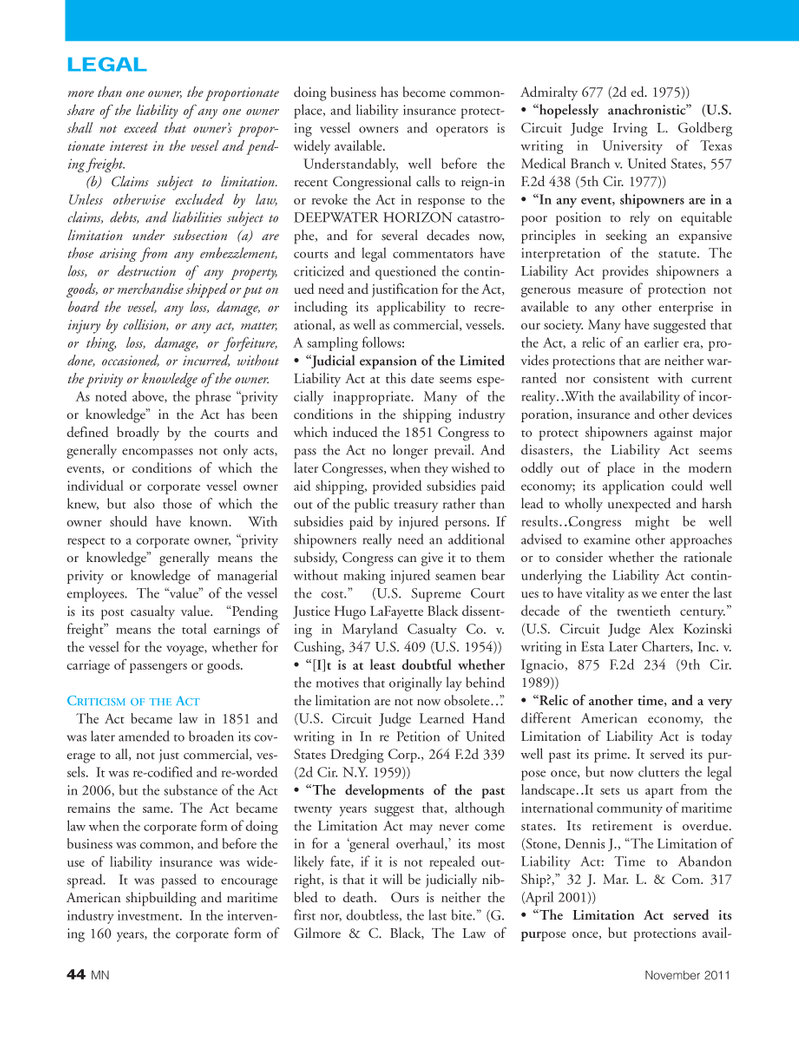
Page 44: of Marine News Magazine (November 2011)
Workboat Annual
Read this page in Pdf, Flash or Html5 edition of November 2011 Marine News Magazine
44MNNovember 2011more than one owner, the proportionate share of the liability of any one owner shall not exceed that owner?s propor- tionate interest in the vessel and pend- ing freight. (b) Claims subject to limitation.Unless otherwise excluded by law, claims, debts, and liabilities subject tolimitation under subsection (a) are those arising from any embezzlement, loss, or destruction of any property, goods, or merchandise shipped or put on board the vessel, any loss, damage, or injury by collision, or any act, matter, or thing, loss, damage, or forfeiture, done, occasioned, or incurred, without the privity or knowledge of the owner. As noted above, the phrase ?privity or knowledge? in the Act has been defined broadly by the courts and generally encompasses not only acts,events, or conditions of which the individual or corporate vessel owner knew, but also those of which the owner should have known. With respect to a corporate owner, ?privity or knowledge? generally means the privity or knowledge of managerial employees. The ?value? of the vessel is its post casualty value. ?Pending freight? means the total earnings of the vessel for the voyage, whether for carriage of passengers or goods.CRITICISMOFTHE ACTThe Act became law in 1851 and was later amended to broaden its cov- erage to all, not just commercial, ves- sels. It was re-codified and re-worded in 2006, but the substance of the Act remains the same. The Act became law when the corporate form of doingbusiness was common, and before the use of liability insurance was wide-spread. It was passed to encourage American shipbuilding and maritimeindustry investment. In the interven- ing 160 years, the corporate form of doing business has become common-place, and liability insurance protect- ing vessel owners and operators is widely available. Understandably, well before the recent Congressional calls to reign-in or revoke the Act in response to the DEEPWATER HORIZON catastro- phe, and for several decades now, courts and legal commentators have criticized and questioned the contin- ued need and justification for the Act, including its applicability to recre- ational, as well as commercial, vessels. A sampling follows: ?Judicial expansion of the Limited Liability Act at this date seems espe- cially inappropriate. Many of the conditions in the shipping industry which induced the 1851 Congress to pass the Act no longer prevail. And later Congresses, when they wished to aid shipping, provided subsidies paid out of the public treasury rather than subsidies paid by injured persons. If shipowners really need an additional subsidy, Congress can give it to them without making injured seamen bear the cost.? (U.S. Supreme Court Justice Hugo LaFayette Black dissent- ing in Maryland Casualty Co. v. Cushing, 347 U.S. 409 (U.S. 1954)) ?[I]t is at least doubtful whether themotives that originally lay behind the limitation are not now obsolete? .?(U.S. Circuit Judge Learned Hand writing in In re Petition of United States Dredging Corp., 264 F.2d 339 (2d Cir. N.Y. 1959)) ?The developments of the past twenty years suggest that, although the Limitation Act may never come in for a ?general overhaul,? its most likely fate, if it is not repealed out- right, is that it will be judicially nib-bled to death. Ours is neither the first nor, doubtless, the last bite.? (G. Gilmore & C. Black, The Law of Admiralty 677 (2d ed. 1975)) ?hopelessly anachronistic? (U.S. Circuit Judge Irving L. Goldberg writing in University of Texas Medical Branch v. United States, 557 F.2d 438 (5th Cir. 1977)) ?In any event, shipowners are in a poor position to rely on equitable principles in seeking an expansive interpretation of the statute. The Liability Act provides shipowners a generous measure of protection not available to any other enterprise in our society. Many have suggested that the Act, a relic of an earlier era, pro- vides protections that are neither war- ranted nor consistent with current reality? .With the availability of incor- poration, insurance and other devicesto protect shipowners against major disasters, the Liability Act seems oddly out of place in the moderneconomy; its application could well lead to wholly unexpected and harshresults? .Congress might be well advised to examine other approaches or to consider whether the rationaleunderlying the Liability Act contin- ues to have vitality as we enter the last decade of the twentieth century.? (U.S. Circuit Judge Alex Kozinski writing in Esta Later Charters, Inc. v. Ignacio, 875 F.2d 234 (9th Cir. 1989))?Relic of another time, and a very different American economy, the Limitation of Liability Act is today well past its prime. It served its pur- pose once, but now clutters the legal landscape?.It sets us apart from the international community of maritimestates. Its retirement is overdue. (Stone, Dennis J., ?The Limitation of Liability Act: Time to Abandon Ship?,? 32 J. Mar. L. & Com. 317 (April 2001)) ?The Limitation Act served its purpose once, but protections avail- LEGALMN#11 (32-49):MN 2011 Layouts 10/27/2011 9:58 AM Page 44

 43
43

 45
45
